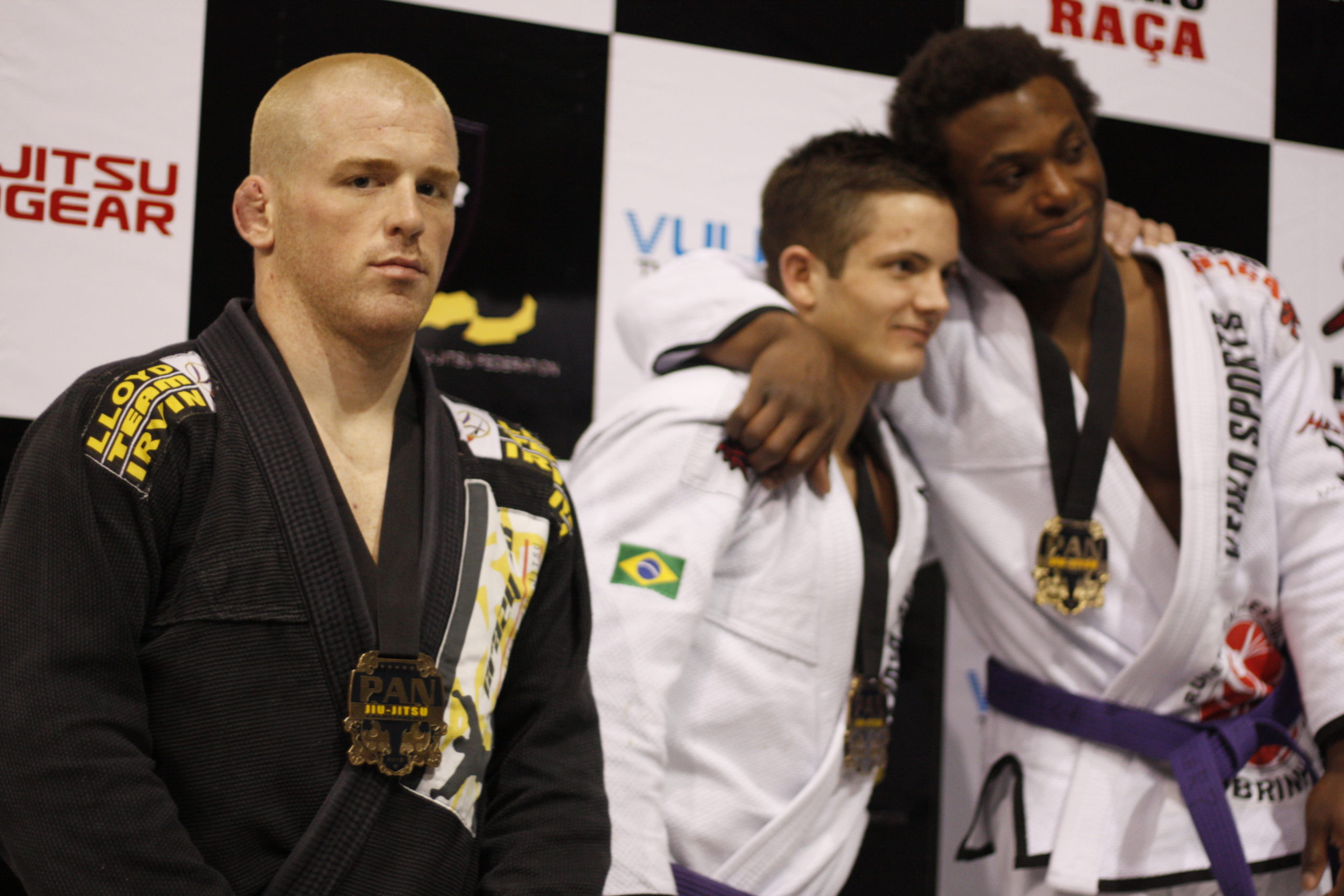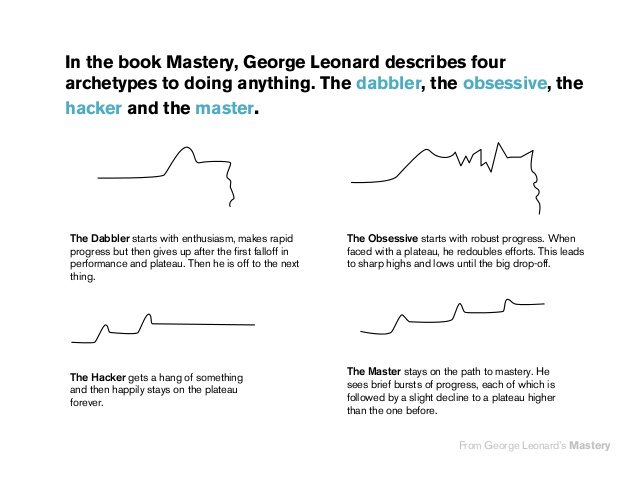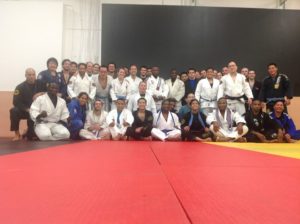BY JAMES SHUPP – I began attending the advanced Jiu Jitsu class about six months into my training. It was quite a shock to the system and took a period of adjustment. Here are some of the strategies that I have used to survive and thrive.
Advanced Class Mindset
Getting good at Jiu Jitsu requires a long term commitment to an often brutal training regimen. I remember coming home after my first advanced class on the verge of tears. I really wanted to get good at Jiu Jitsu, but the training was far more intense than anything I had experienced in the basics classes. The basics classes are only one hour long, no more than ten or fifteen minutes of which are dedicated to sparring. The advanced classes are an hour and a half. Thirty minutes of sparring is the norm, and one hour sparring sessions are not uncommon. Having begun training in my early 40s, I honestly had no idea whether I would be able to adjust to such an intense workout. The key is to have the proper mindset.
Mindset is about understanding what your focus should be. Jiu Jitsu takes a long time to master. If you don’t train consistently, you might never reach the higher levels. Therefore, your focus should be on doing the things that will allow you to train consistently. These include:
Avoiding injuries
If you are constantly getting injured, you will not be able to train consistently. Therefore, avoid doing things that likely will lead to injury. These include thrashing about in order to free yourself from an armlock or foot lock, doing fast transitions that you have not drilled enough, and doing moves that require too much muscle strain. It is OK to try and win, but not at the expense of safety.
Committing to a schedule
I come to class on Tuesday’s, Thursday’s and Friday’s. Those are my days to train. Sometimes, I’m so exhausted from work and kids, that I can barely keep my eyes open before I even get to class. Many people convince themselves that it’s alright to skip class under such circumstances. Having a set schedule is a psychological tool to make you feel obligated to go to class during such times. This will be reinforced by fellow regular students and coaches who will begin to count on you showing up. Sometimes, I go to class because I don’t want to disappoint my training partners. Whatever it takes to get you in the car and on your way to class…
Thinking about Jiu Jitsu
Even when you’re not training, try to keep your mind on jiu jitsu as much as possible. I listen to Jiu Jitsu themed podcasts, watch training videos, read books about the history of Jiu Jitsu…you name it. I also write detailed notes on the moves I learn in class. I even keep a Jiu Jitsu journal. All of this keeps me in a Jiu Jitsu state of mind, which helps keep me motivated to continue coming to class. There’s nothing wrong with taking your mind off Jiu Jitsu every once in a while. In fact, this is healthy. However, you don’t want to allow yourself too much time to not think about Jiu Jitsu. Thought inspires action. If you do things that will make you think about Jiu Jitsu, you are much more likely to remain enthusiastic about coming to class.
Staying focused on the journey
A martial artist is someone who does martial arts. Belts and medals are great, but those are not the martial arts. Those are ways you can get recognized for excelling at martial arts. They are way stations in a life long journey. Don’t dwell too much on the way stations. If you are going to class regularly and if you are improving, then you are doing martial arts. I would rather be a white belt who trains regularly than an out of shape black belt who has not stepped on the mats in years.
Swallowing your pride
In order to get good at Jiu Jitsu, you have to be willing to try new moves. Trying new moves against advanced grapplers often leads to humiliating defeat. Don’t worry about it. Analyze what went wrong, and then try the move again. Try the same move on a variety of different grapplers of various sizes and skill levels. Learn when to do the move and when not to do the move. This type of progress is only possible if you are not hyper focused on avoiding defeat at all costs.
Advanced Class Culture
The best way to get good at Jiu Jitsu is to work with people who are better than you. In the advanced class, you are much more likely to be paired with an advanced partner than in a basics class. That means your partner likely will be doing the techniques correctly, and will also want to make sure that you are doing the techniques correctly. It is important to remember that your advanced partner also is trying to get better, and will respond better to a partner who makes an effort to perfect the techniques rather than spending the time socializing.
During sparring, an advanced grappler will expose holes in your game that you never knew existed if you only have ever sparred with white belts and newer blue belts. It is tempting to go faster and harder in order to compensate for your inferior technique. It is best to resist this impulse, since it will force your partner to respond in kind. Going harder and faster won’t increase your chances of winning against a superior grappler, but it will lead to more injuries. If you injure yourself, you won’t be able to train. If you injure your partners, they won’t want to train with you.
White belts often feel like outsiders in an advanced class. It is not intentional on the part of the upper belts. You have to understand that most white belts train for a short time and then quit. If you want the upper belts to know your first name, you will have to stick around for long enough for them to remember it. Show them that you are serious about learning jiu jitsu by coming to class regularly, and they will take you seriously.
Washing your gi after each training session and keeping your fingernails and toenails clipped are also ways to show consideration for your training partners, many of whom you will be working with for years to come. By being a good training partner, you will make it easier for people to want to help you get to the next level.

Advanced students will respond better to a partner who makes an effort to perfect the techniques rather than spending the time socializing
How to Survive
Training in the advanced class can be quite taxing physically and mentally. But, it can also be quite fun and rewarding. Here are some additional things that can help you to survive:
Nutrition
Nutrition is crucial, especially as you get older. Your body needs proper nutrients in order to function at such a high tempo. Make sure that you are eating a balanced diet, in keeping with your age, gender and height. The American Heart Association and the Mayo Clinic are good resources. I usually eat an hour or two before class. My meal is usually no more than 600 calories. After I get home from my workout, I usually have a banana and a yoghurt. A light after workout snack will help you get to sleep quicker.
Pace yourself
Push yourself during training, but recognize your limits. Figure out where the rest spots are located, and learn to breath deeply during those times. This will get your heart rate down to a more reasonable level. In the book “10-minute Toughness”, author Jason Selk talks about the 6-2-7 rule. Breath in for six seconds, hold for two, and breath out for seven seconds. This simple breathing technique helped me immensely during my early days in the advanced class.
It’s not about winning
We all like to win. However, I can’t think of a single Jiu Jitsu world champion who hasn’t been put into a dangerous spot at some point in their career. Even Roger Gracie was nearly submitted with an arm bar by Buchecha. Don’t be discouraged by getting your back taken all the time. Recognize it as a great opportunity to cultivate solid defense early on in your career. The only way to learn how to defend a mount Ezekiel is to be constantly attacked with it by people who are good enough to pass your guard and mount you.
The longer you can defend submissions, the more time you will have to look for an escape. The more you escape, the more opportunities you will have to play guard. The more you play guard, the better you will get at sweeps. The better you get at sweeps, the more you will be able to work your guard passing. The more you work your guard passing, the better you will get at passing guard. The more you pass people’s guards, the more opportunities you will have to practice submitting people. But first, you have to learn to defend yourself. Only after learning to defend yourself, will you be able to win… eventually.
Don’t sprint to blue belt
This seems to be a common phenomenon. I’ve seen so many people train like maniacs in order to get their blue belt, only to get burned out and stop coming regularly once they get it. The goal is to practice Jiu Jitsu for life. Practice as often as you can, but don’t overtrain. In order to progress, you should be training at least two or three times per week in the advanced class. If you can train more than that, then great, but remember that learning Jiu Jitsu is a marathon not a sprint.


